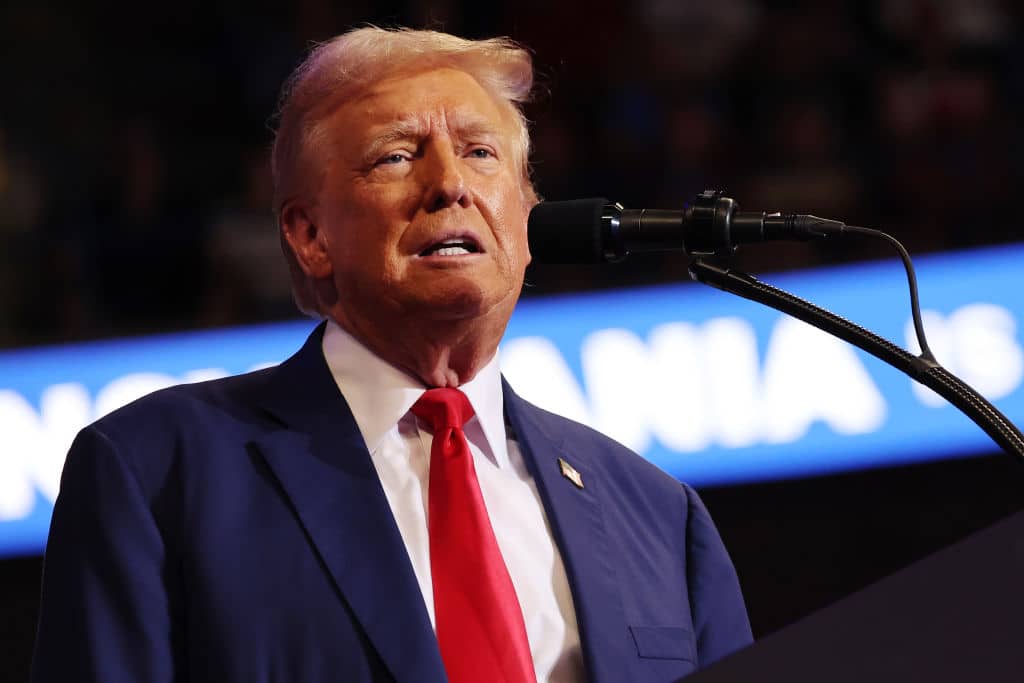
The United States’ sweeping tariff policies against over 90 countries finally took effect Thursday morning, slapping a 15% tariff on Israeli imports.
Israel had hoped to curb Trump’s tariffs when Prime Minister Benjamin Netanyahu announced the elimination of all tariffs on goods imported from the U.S. and traveled to the White House. However, U.S President Donald Trump still issued a 17 percent tariff on his self-declared “liberation day,” which was later lowered to 15%.
Israel, a longstanding ally of the U.S., now faces similar tariffs to fellow allies South Korea, Japan, and the European Union. Some critics also blasted the 15% tariffs on countries the U.S. has been in conflict with, such as Taliban-controlled Afghanistan.
The international duties are expected to cost Israel billions, raising prices on goods like kosher food, Judaica, and the country’s largest export: diamonds. The Jewish State is expected to see a decline in its export market and tax revenue as a result.
If Trump goes ahead with his plan to levy heavy taxes on semiconductors, the effect will be felt even stronger in Israel.
What will the toll be on the Israeli economy — and for Jewish Americans looking to buy Israeli goods? Let’s unpack it.

What has Israel’s response been to Trump’s tariffs?
The Israeli Finance Ministry has attempted to downplay the impact tariffs will have on the economy, explaining that the 15% rate is “at the lowest level among countries that have a trade deficit with the US.”
It claims that the number “reflects the ongoing dialogue between Israel and the administration with the aim of reaching an improved agreement.”
Trump, who has repeatedly claimed that the sweeping tariffs are a necessity for the U.S. to regain the world’s respect and correct trade imbalances, has been widely criticized by most economists who claim that the taxes will negatively impact the global economy and cause prices for U.S. consumers to skyrocket.
In the U.S., Trump’s tariff policies and their uncertainty have been associated with the Federal Reserve’s refusal to lower interest rates, slower economic growth than expected in 2025, and underperforming jobs reports for months.
Since the initial tariffs were announced, Israel had hoped to negotiate the U.S. down to 10%, but was unable to do so.
“Don’t forget, we help Israel a lot,” Trump said in the Oval Office with Netanyahu in April. “We give Israel $4 billion a year, that’s a lot.”

What will the effect of tariffs be on Israel’s economy?
That month, the Manufacturers Association of Israel expressed concern that Trump’s tariffs would cause 26,000 Israelis to be laid off.
With the 15% tariffs, Israeli exports are expected to take a hit of $2 billion to $4 billion, according to Ron Tomer, president of the Manufacturers Association of Israel.
A recent survey found that Israel would lose over $290 million in tax revenue as a result of the tariffs with “probable” job losses and a decrease in company revenues.
“At least a third of the exporters to the US have lowered their prices in the US to offset the hit to their competitiveness following the imposition of the tax,” the report found. “While the reduction is only a few percentage points, this means a drop in the taxes they owe to Israel — that is, a drop in the taxes they’ll pay the state.”
Economist Shlomo Maoz told the Times of Israel that the tariffs will not severely impact the Israeli economy because similar tariffs are being applied to many other major economies.
“If they were to tax Israel only, we would have taken a hard hit, because exporting to the US would have stopped being competitive,” Maoz said. “But in a reality where the whole world is being taxed, and the rate for some countries is even higher, the damage to us will be relatively small.”
However, Tomer claimed that it will hurt the Israeli economy more than many others because it removed the competitive edge of a free trade agreement, which made it enticing for companies to move to or begin in the Jewish state even though production costs are lower in many other countries.
“We may be in the same situation as many other countries are, but we lost the benefit that we enjoyed with the free trade agreement and need to compete with countries such as Turkey, which previously paid taxes and has lower production costs than Israel. Without the comparative advantage, we are bound to lose sales.”
Israel’s status as “Startup Nation” will likely be threatened, he added, because more established countries with tech centers like Japan and Germany face the same tariffs, and the United Kingdom is only tariffed at 10%.
“We were in good trade negotiations with the US, and they were opening up to come in favor of Israel,” he added. “For years, we had an advantage over many countries due to Israel’s free trade agreement, benefiting from zero duties while exporting to the US.
“Now, we have lost an advantage over Turkey, Japan, Britain, and other countries.”
How will this affect kosher foods and Israeli imports?
Tariffs are typically passed on to consumers through higher prices, as businesses adjust to maintain profit margins. If applied across the board, the 15% tariff on 2024’s $22.2 billion worth of Israeli goods would cost American consumers an estimated additional $3.3 billion.
Israel primarily imports precious stones and metals (mainly diamonds); pharmaceuticals; electrical and electronic equipment; and optical, photographic, technical, and medical apparatus to the U.S.
Israel is estimated to have imported $5.43 billion to the U.S. in diamonds in 2023, making up more than 10% of the American diamond market. The tariffs will likely see engagement rings and other fine jewelry increase in price.

Israeli tech exports, which make up 53% of exports to the U.S. from the Jewish state, are not expected to be largely impacted, since 70% of those exports are services, which will not be tariffed. However, the 30% of goods that will be taxed, primarily industrial equipment and machinery, will face tariffs. Defense equipment, which is 7.5% of Israel’s exports to the U.S., will face tariffs.
Tomer explained that exporters in Israel are struggling with how to proceed with tariffs. At 15%, he said, many are planning on placing at least some of the burden on American consumers in order to remain profitable.
“At 10% there was still room to share the burden with US customers, with a 15% rate it’s more problematic and difficult to absorb the costs,” he said.
Trump has flirted with the idea of a 100% tariff on semiconductors produced by non-American companies. If these tariffs extend to semiconductors and pharmaceutical components, Tomer estimates that anywhere from 20,000 to 33,000 Israelis will lose their jobs.
Kosher-certified foods, many of which are imported from Israel, are expected to rise in price. Judaica — including prayer items such as Torah scrolls, mezuzahs, and tefillin — may also see price hikes, given that many are crafted in Israel by specialized artisans and soferim or highly-specific factories.
While much of the kosher poultry consumed in the U.S. is domestically raised, a significant portion of kosher beef is imported from countries like Uruguay, Argentina, and Brazil, which were hit with 10%, 10%, and 50% tariffs, respectively, under Trump’s new trade policy.
Since American beef — both kosher and non-kosher — is more expensive due to higher production and labor costs, these tariffs are unlikely to make U.S. meat the cheaper alternative. In other words, kosher consumers may face higher prices across the board, regardless of whether the meat is imported or domestic.

What were Israel’s tariffs on the U.S.?
The Trump administration alleged that Israel imposed a 33% tariff on American goods. In reality, that claim is inaccurate.
Since the 1985 Israel–United States Free Trade Agreement, 98% of U.S. exports to Israel have entered the country duty-free. The remaining 2% — primarily agricultural products — accounted for only $11.3 million annually (about 42 million shekels), according to Israel’s Finance Ministry.
“Today we canceled all of the customs duties levied on products from the U.S., Israel’s largest trading partner,” Netanyahu wrote on X. “Canceling the customs duties on American goods is an additional step in the policy that my governments have led for a decade in opening up the market to competition.”
The move was widely viewed as a goodwill gesture aimed at reinforcing economic ties — a gesture that now appears to have gone unreciprocated. X owner Elon Musk, a former Trump ally, reacted with a minimalist post: two emojis — an American flag and an Israeli flag.
Why is Israel being targeted for tariffs?
The Trump administration framed the new tariffs as part of a broader effort to reduce trade deficits and correct the “lack of reciprocity in our bilateral trade relationships.”
“These tariffs will remain in effect until such a time as President Trump determines that the threat posed by the trade deficit and underlying nonreciprocal treatment is satisfied, resolved or mitigated,” the White House said.
Another White House official had a different hypothesis for the focus on Israel ahead of the announcement: “Israel steals a lot of intellectual property from, for example, the pharmaceutical manufacturers in this country.” However, no evidence was provided to substantiate this allegation.
In 2024, the U.S. imported $22.2 billion in goods from Israel while exporting $14.8 billion — a trade imbalance of $8.2 billion. While significant, the broader context tells a different story: Roughly one in every 10 products imported by Israel comes from the U.S.
Originally Published Aug 7, 2025 05:15PM EDT
